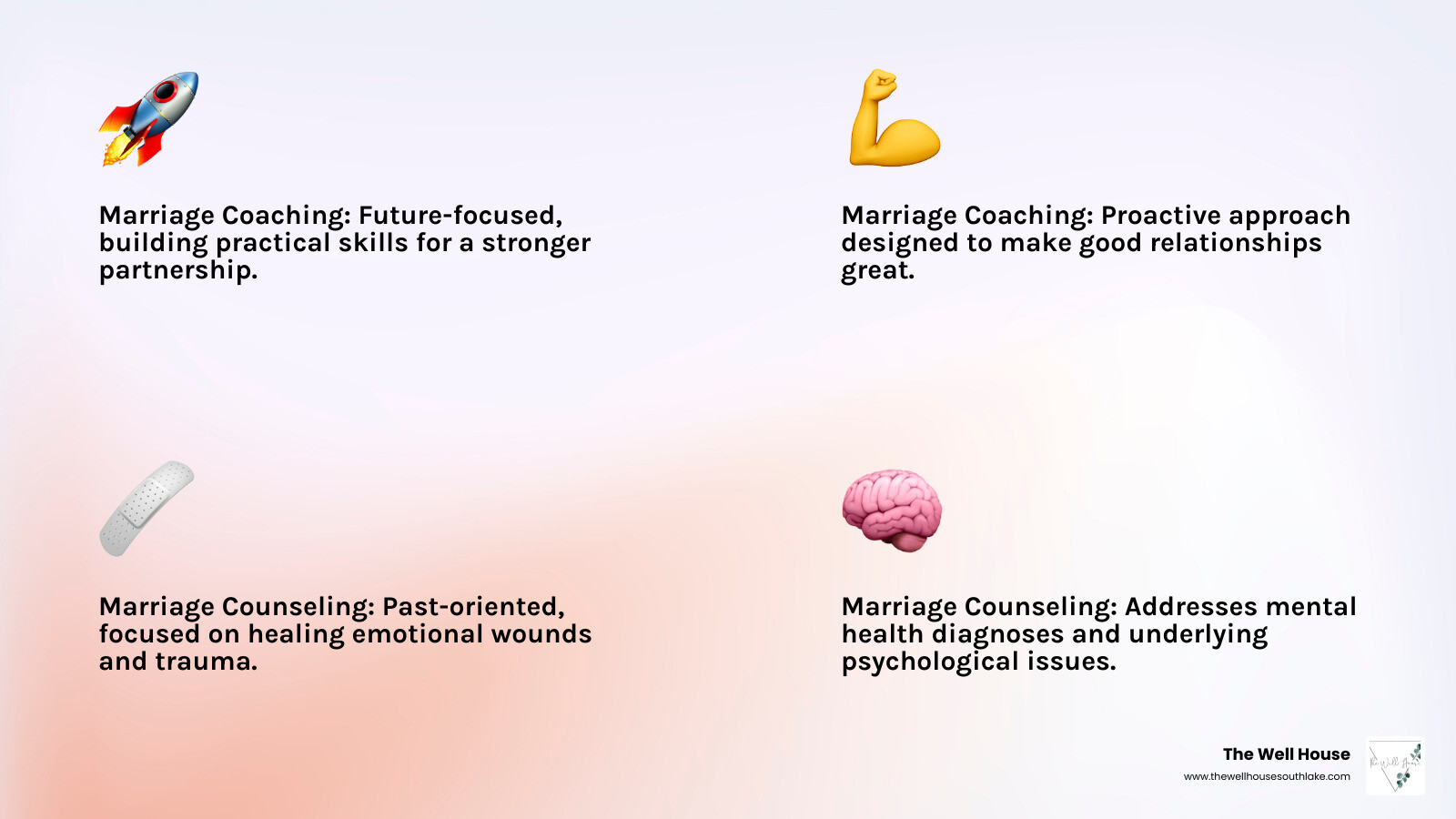Coaching for Couples: Your Local Guide to a Happier Marriage
Why Finding Marriage Coaches Near You Could Transform Your Relationship
Searches for marriage coaches near me are growing as couples find the value of proactive relationship support. Unlike therapy, which often addresses past wounds, marriage coaching is future-focused. It provides practical skills to help good relationships become great.
Quick Answer for “Marriage Coaches Near Me”:
- Online directories: Psychology Today, Gottman Referral Network
- Local referrals: Ask doctors, therapists, or friends
- Professional organizations: Look for certified coaches (Gottman, Prepare/Enrich, SYMBIS)
- Virtual options: Many coaches offer flexible online sessions
Coaching focuses on building skills over diagnosing problems. Couples who engage in proactive coaching build relationship resilience for future challenges. A significant 96% of clients report feeling supported and understood by their coach, leading to improved marriages.
The key difference is that coaching is relational and personalized. Sessions are flexible—they can happen in your home, a coffee shop, or online. Coaches use proven methodologies to help you build communication, conflict management, and intimacy skills before minor issues escalate.
As a professional in the Dallas-Fort Worth area, I’ve seen how marriage coaches near me searches connect couples with vital support. A soul-mind-body approach helps couples find alignment and create lasting change.

Marriage coaches near me terms explained:
Understanding Marriage Coaching: What It Is and How It Helps
What is marriage coaching and how does it differ from marriage counseling?
Marriage coaching and marriage counseling both aim to help couples, but they have different approaches. Marriage coaching is a proactive, forward-looking process. It focuses on empowering you and your partner with practical skills to achieve your relationship goals. A coach provides a fresh perspective and personalized strategies in a flexible setting, including online.
Marriage counseling, in contrast, is more clinical. Licensed counselors explore past experiences and heal emotional wounds, often addressing underlying mental health diagnoses that impact the relationship. While counseling is vital for deep healing, its focus differs from coaching’s skill-based methods.
Here’s a quick way to see the differences:
| Feature | Marriage Coaching | Marriage Counseling |
|---|---|---|
| Primary Focus | Future-oriented, goal-setting, skill-building | Past-oriented, healing trauma, mental health diagnosis |
| Approach | Relational, personalized, action-oriented | Formal, clinical, often diagnosis-driven |
| Methodology | Practical tools, strategies, accountability | Therapeutic techniques, emotional processing |
| Setting | Flexible (online, home, coffee shop) | Typically formal office settings |
| Duration | Often shorter-term, focused on specific goals | Can be longer-term, addressing deeper issues |
| Qualifications | Certifications, personal experience | Formal degrees (e.g., LMFT, LPC), licenses |
What are the benefits of marriage coaching?
Engaging with a marriage coach offers transformative benefits for a stronger, happier partnership.
- Improved Communication: Coaching provides concrete skills to articulate needs, listen actively, and feel heard, turning arguments into meaningful exchanges. Learn more about communicating with your partner for better connection.
- Stronger Conflict Resolution: You’ll gain tools to manage disagreements constructively, moving beyond bickering to productive problem-solving. Explore strategies for conflict resolution in marriage counseling.
- Deeper Connection and Intimacy: Coaching helps rekindle the spark by guiding you to prioritize each other and increase emotional and physical closeness.
- Proactive Relationship Strengthening: Coaching isn’t just for crises. It’s for couples who want to build a resilient foundation, preventing minor issues from becoming major problems.
What are some common myths about marriage coaching?
Let’s clear up a few common myths about marriage coaches near me and relationship coaching.
- Myth: It’s only for failing marriages.
- Fact: Coaching is powerful for good marriages that want to be great. It’s like going to the gym to maintain and improve fitness—it proactively strengthens your bond and prevents future issues.
- Myth: It’s the same as therapy.
- Fact: Coaching and therapy are distinct. Coaching is action-oriented, focusing on skills and future goals. Therapy often digs into past trauma, mental health diagnoses, and deeper emotional processing.
- Myth: The coach takes sides.
- Fact: A qualified marriage coach is a neutral facilitator. Their role is to create a safe, non-judgmental space where both partners feel heard and respected, focusing on the health of the relationship as a whole.
How effective is marriage coaching?
The effectiveness of marriage coaching is significant when both partners are committed. Here’s what experience and research show:
- Improved Outcomes: Many couples report significant improvements in their marriage, feeling more connected and better equipped to handle disagreements.
- High Client Satisfaction: A remarkable 96% of clients feel truly supported and understood by their therapist or coach, which is crucial for creating an environment where change can happen.
- Building Skills for Long-Term Success: Coaching provides sustainable skills for your relationship toolkit, empowering you to steer future challenges independently.
- Proactive Benefits: Addressing issues proactively through coaching leads to more positive outcomes, building a stronger foundation before a crisis hits.
For couples ready to invest in their relationship, marriage coaching is a highly effective way to build a more fulfilling future.
Is Marriage Coaching Right for You? Signs and Solutions
What are the signs that a couple might need a marriage coach?
Recognizing the signs that you might benefit from a marriage coach is the first step toward positive change. Common indicators include feeling like roommates, constant bickering, communication breakdowns, a lack of intimacy, or feeling lonely within the marriage.
Consider reaching out to marriage coaches near me if you experience these more specific signs:
- You argue about the same things repeatedly.
- You feel emotionally disconnected.
- You avoid difficult conversations.
- The passion is gone.
- You are more critical than appreciative of each other.
- Divorce has been discussed or threatened.
- You’ve hurt one another and don’t know how to move forward.
If these resonate, know that help is available.
Can coaching help with specific issues like infidelity or communication problems?
Marriage coaching is highly effective for navigating specific challenges. Coaches can help with:
- Communication Problems: Learn to move from arguments to meaningful dialogue by expressing needs and listening empathetically. Understanding love languages can also deepen connection.
- Intimacy and Sex Life Issues: Coaching provides a safe space to discuss sensitive topics, helping rebuild passion and a fulfilling physical relationship, often using principles from Emotionally Focused Therapy (EFT).
- Rebuilding Trust After Infidelity: While difficult, healing is possible. Coaching guides couples through accountability, forgiveness, and rebuilding a new foundation of trust.
- Parenting Differences: Coaches help you align on shared values and strategies, fostering a united front that benefits your relationship and your children.
Coaching provides custom solutions for your unique challenges, helping you build a more resilient partnership.
How can marriage coaching help prevent future relationship problems?
Marriage coaching is a powerful preventative tool. Instead of waiting for a crisis, it helps you build a robust foundation to withstand future challenges. Here’s how:
- Building a Strong Foundation: Coaching reinforces your core strengths and ensures you’re aligned on values, goals, and expectations.
- Learning Skills Before Crises Hit: It equips you with essential tools for communication and conflict resolution, so you’re prepared for life’s challenges.
- “Relationship Tune-Ups”: Periodic sessions can help fine-tune your connection and address minor issues before they grow. This is a key part of premarital programs like Prepare/Enrich.
- Positive Impact on Children’s Well-being: A healthy marital relationship creates a secure environment for children. By modeling effective conflict resolution, you positively impact their emotional and psychological well-being.
Your Guide to Finding Qualified Marriage Coaches Near Me
How do I start my search for marriage coaches near me?
Starting your search for marriage coaches near me is easier than you think. Here are some great places to begin:
- Online Directories: Websites like Psychology Today or the Gottman Referral Network allow you to filter by location, specialty, and coaching style.
- Referrals: Ask your individual therapist, primary care doctor, friends, or family for recommendations. You can also search for coaches trained in specific methods you’re interested in, like Emotionally Focused Therapy (EFT).
- Online Coaching: Don’t limit your search by location. Many excellent coaches offer online sessions, giving you more flexibility and a wider pool of experts. This is a great option for those in Southlake, Westlake, Grapevine, Roanoke, or Trophy Club, TX. Learn more about online couples counseling near me.
Take your time to research and find the right fit for your relationship.
What should I look for in a marriage coach?
When choosing from potential marriage coaches near me, look for a professional who is the right fit for you and your partner. Key qualities include:
- Experience with Couples: Ensure they have specific experience working with relationship dynamics.
- Relevant Certifications: Look for training in proven methods like Gottman, Prepare/Enrich, or SYMBIS, which indicate a commitment to professional standards.
- Clear Methodology: The coach should be able to explain their approach and how it aligns with your goals.
- Good Rapport: You both should feel comfortable, heard, and respected. Use an initial consultation to gauge the connection.
- Professional Subjectivity: A skilled coach remains neutral and doesn’t take sides. They should adhere to a strong code of ethics, like the one from the American Psychological Association, ensuring confidentiality and professionalism.
What are the qualifications or training of a marriage coach?
The marriage coaching industry isn’t government-regulated like therapy, so it’s important to know what to look for in a qualified professional.
The best indicator of expertise is certifications from reputable programs. Look for training in established methods like the Gottman Method, Prepare/Enrich, or SYMBIS (Saving Your Marriage Before It Starts). These show a commitment to best practices.
Many effective coaches also have backgrounds in psychology, counseling, or social work, giving them a deep understanding of relationship dynamics.
Finally, consider their experience and testimonials. A history of successfully helping couples with issues similar to yours is invaluable. Always ask about a coach’s specific training, experience, and confidentiality practices during your initial consultation.
Are there different approaches used by marriage coaches?
Yes, marriage coaches use various effective approaches. Understanding them can help you find a coach whose style fits your needs.
- The Gottman Method, backed by 40 years of research, focuses on building a “Sound Relationship House” through better communication, conflict management, and intimacy. Research confirms the Gottman Method improves marital relationships. Learn more at gottman.com.
- Emotionally Focused Therapy (EFT) principles help couples understand and change negative interactional patterns to build a more secure emotional bond.
- Solution-Focused Coaching is a goal-oriented style that builds on your strengths and helps you take actionable steps toward your ideal future.
- Relational Life Therapy (RLT) helps partners understand how past experiences shape current behaviors, encouraging accountability and open-hearted connection.
When searching for marriage coaches near me, ask about their primary approach to ensure it aligns with your goals.
The Practical Side of Marriage Coaching: What to Expect
What can I expect during a marriage coaching session?
Your first marriage coaching session is the start of a promising journey. Here’s what you can generally expect:
- Initial Assessment & Goal Setting: Your coach will get to know you and your relationship history. Together, you’ll define clear, specific goals to create a roadmap for your work.
- Interactive Exercises & Communication Practice: Sessions are active and engaging. You’ll practice new communication skills, learn to see each other’s perspectives, and break unhelpful patterns.
- Homework Assignments: You’ll receive practical exercises to apply between sessions. This reinforces new skills and helps make healthy behaviors a natural part of your routine.
- Collaborative Guidance: Your coach acts as a non-judgmental guide, creating a safe space for open expression. It’s a team effort focused on achieving your shared vision for a stronger relationship.
How can I prepare for my first marriage coaching session?
Preparing for your first marriage coaching session helps you get the most out of the experience. Here are a few simple steps:
- Discuss Goals with Your Partner: Talk about what you both hope to achieve. Having a shared vision sets a positive tone.
- Be Open-Minded: Be willing to try new perspectives and approaches. Growth often comes from unexpected places.
- Be Ready to Be Vulnerable: The coaching space is confidential and non-judgmental, so be prepared to share your thoughts and feelings honestly.
- Write Down Key Issues: Jotting down main challenges or specific incidents can help you stay focused during the session.
- Commit to Participating: The most profound changes happen when both partners are committed to the joint effort.
These steps will help you have a productive first session with your marriage coach.
What are the costs associated with marriage coaching?
When searching for marriage coaches near me, it’s natural to consider the cost. Fees vary based on the coach’s experience, qualifications, and location.
Unlike therapy, which is often billed per session, coaching is frequently sold in packages (e.g., multi-month programs) to encourage consistent work and lasting change. For context, couples therapy often costs between $175 to $275 a session, and coaching fees can be in a similar range.
Marriage coaching is rarely covered by an insurance company because it’s not considered a medical service for a mental health diagnosis. Always discuss fees with a prospective coach. Investing in coaching is an investment in your long-term happiness and well-being.
How long does marriage coaching typically last?
A common question about marriage coaching is how long it takes. While every couple is different, coaching is typically more focused and shorter-term than traditional therapy.
Most coaching programs last 3 to 6 months, with weekly or bi-weekly sessions. This timeframe is usually sufficient for building skills and forming new habits. The exact duration depends on your goals and the complexity of the issues.
Coaching is results-oriented, designed to equip you with practical tools for long-term success. The goal is to empower you to manage your relationship’s growth independently. Consistent effort between sessions is key to achieving lasting change. Similar to therapy, which shows improvement with consistent weekly sessions, focused coaching work can yield positive results in a concentrated period.
Your Top Questions About Marriage Coaching Answered
Is marriage coaching better than counseling?
One isn’t inherently “better” than the other; they simply serve different purposes.
- Coaching is for Skill-Building and Future Goals: Choose marriage coaching if you want to proactively strengthen your relationship, learn new communication skills, and set shared goals. It’s about taking a good relationship and making it great.
- Counseling is for Healing and Mental Health: Choose marriage counseling with a licensed therapist if your relationship is impacted by deep-seated issues, past trauma, or mental health challenges that require clinical healing.
The best choice depends on your specific needs. An initial consultation can help you determine the most beneficial path. When you search for marriage coaches near me (or counselors), the goal is to find the right support for you.
How do I convince my partner to try marriage coaching?
It’s common for one partner to be more hesitant about seeking support. If you need to convince your partner to try marriage coaching, here is some advice:
- Focus on the Positive: Frame coaching as a proactive investment in your shared future, not a sign of failure.
- Frame It as Team Skill-Building: Suggest it as a way for you both to learn new tools to connect and communicate better.
- Emphasize It’s Not About Blame: Reassure them that a coach is a neutral facilitator focused on strengthening the relationship.
- Address Their Fears Gently: Ask about their concerns. Resistance often comes from fear of judgment or vulnerability.
- Make a Gentle Ask: Try, “Would you be open to just one session to see what it’s like?”
- Consider Individual Coaching: If your partner refuses, you can still benefit from individual coaching, which can positively shift the relationship dynamic.
Patience and empathy are key.
Can I do marriage coaching online?
Yes! Online marriage coaching is a popular, effective, and convenient option.
- Flexibility and Convenience: Online sessions eliminate travel time and make scheduling easier, which is a great benefit for busy couples.
- Wider Choice of Coaches: Virtual coaching removes geographical barriers, giving you access to a broader pool of qualified marriage coaches near me (or anywhere).
- Effectiveness: Studies show that internet-based couples therapy can be as effective as in-person sessions.
- Comfort and Privacy: Many couples find it easier to open up from the comfort and privacy of their own home.
At The Well House, we offer telehealth options, providing our collaborative, holistic approach to clients in Southlake, Westlake, Grapevine, Roanoke, Trophy Club, and beyond.
Insurance & Payment Options at The Well House Southlake
At The Well House Southlake, we understand that seeking support for your marriage is a significant step. That’s why we offer marriage counseling that takes insurance, making it easier for you and your spouse to access the professional help you deserve.
We currently accept:
- Blue Cross Blue Shield (BCBS)
- Aetna
- UnitedHealthcare (UHC)
- Self-Pay and Out-of-Network Options
If you’re searching for couples counseling covered by insurance, our team is here to assist you in verifying your benefits and scheduling your sessions. We aim to make the process as seamless as possible so you can focus on strengthening your relationship.
Conclusion: Take the Next Step Towards a Stronger Partnership
We hope this guide has clarified what marriage coaching offers. It’s a powerful, proactive tool for any couple wanting to deepen their connection, improve communication, and build a joyful, resilient partnership. By investing in your marriage, you can turn good intentions into lasting positive change.
When you search for marriage coaches near me, know that The Well House is here to support you. We are passionate about helping individuals, couples, and families in Southlake, Westlake, Grapevine, Roanoke, and Trophy Club, TX, flourish. Our unique mind-body-spirit approach and flexible telehealth options ensure you receive compassionate, expert guidance custom to your journey.
Are you ready to build a stronger foundation for your partnership? Take the next step. Explore our Marriage Counseling and Couples Therapy services to see how our team can help you write your happiest relationship story.














